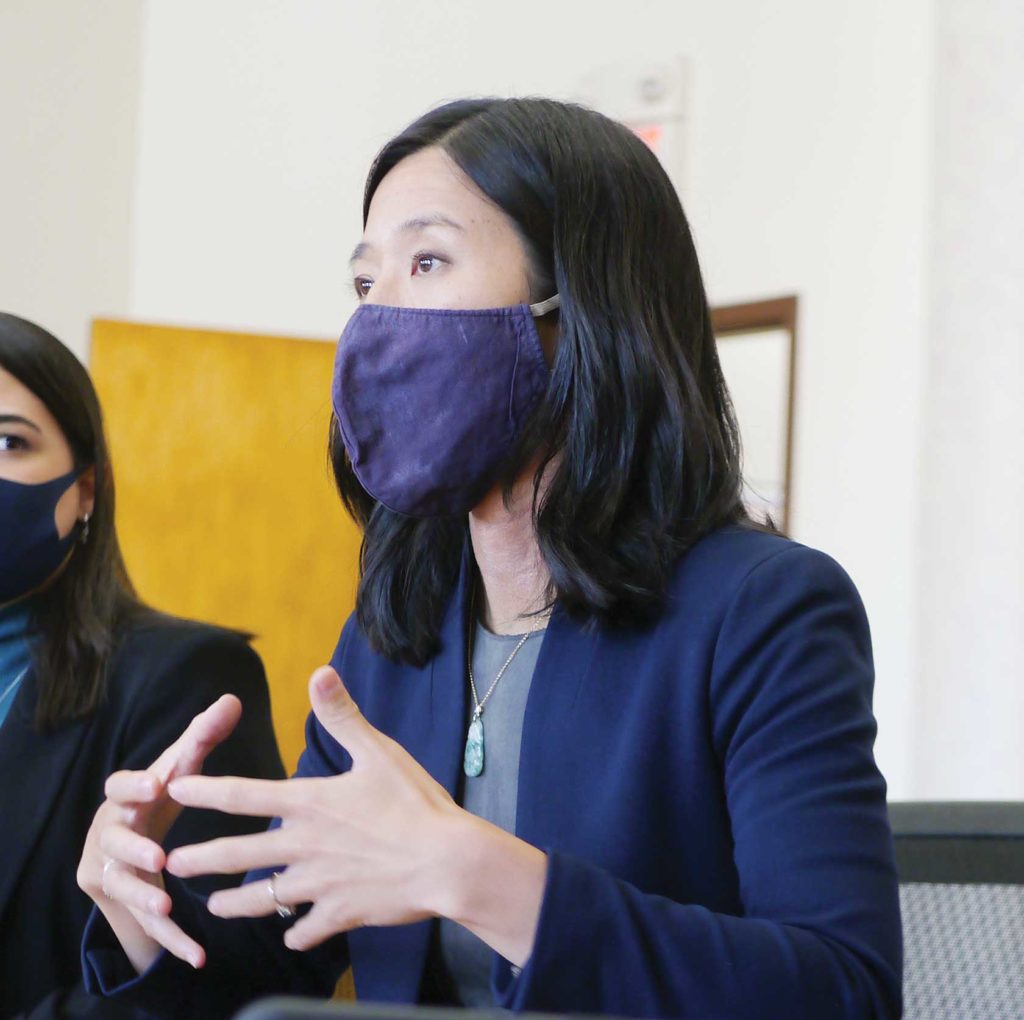Wu says cabinet will reflect city’s diversity
People of color underrepresented in higher-paying city government jobs

Mayor-elect Michelle Wu pledged last week to assemble a cabinet and department heads who are majority people of color.
“The goal is to ensure that our cabinet and the workforce of City Hall reflects the diversity of our city, represents the expertise that lives in our communities, and moves with the urgency of the issues facing our families,” Wu said during a meeting with ethnic media outlets on Thursday.
Activists have long sought greater inclusion of Blacks, Latinos and Asians in leadership positions in city government. While Blacks make up 29% of the city’s workforce, they’re concentrated in lower-paying city jobs, accounting for 43% of those earning $20,000 or less and only 21% of those making more than $100,000 a year, according to the city’s Employee Demographics Dashboard.
Latinos, who make up nearly 20% of the city’s population, account for just 14% of the city government workforce and are just 8.8% of those earning more than $100,000 a year. Asians make up about 10% of the city’s population but just 4.6% of the city of Boston workforce.
Representation in positions with decision-making authority is an important strategy for making city government more responsive to the needs of the communities served by city government, said Segun Idowu, executive director of the Black Economic Council of Massachusetts (BECMA).
“We should have people in place who don’t need a crash course on the experiences of half of the city of Boston,” he said. “We need people who are responsive to our communities.”
While former Mayor Martin Walsh touted his administration as the one with the highest number of people of color, few of his appointments led departments with sizeable budgets or personnel.
“It’s all for naught if the people in positions aren’t empowered to execute policies,” Idowu said.
Departments headed by people of color tend to show better representation of Blacks, Latinos and Asians in managerial positions. In the Public Health Department, a department that has been headed by three Latinos in recent years — Barbara Ferrar, Felix G. Arroyo and Marty Martinez — Latinos make up 46% of the workforce and account for 66% of those earning more than $100,000 a year. Blacks account for 33% of those in that income bracket.
José Massó, who sits on Wu’s transition team, said having a more diverse workforce in city departments such as Public Health ensure that city government is more responsive to the needs of the city’s communities.
“It’s imperative that when folks interact with the City of Boston, they see folks who look like them,” he said. “If there’s one area where you need people who have cultural competency, it’s Public Health.”
Massó also argued that Blacks, Latinos and Asians should have the same access to the well-paying city jobs that for decades were dominated by the city’s Irish American and Italian American communities.
“One of the enablers of people to move from a working-class status to upward mobility has traditionally been government,” he said.
Wu says she plans to fill her cabinet by the Jan. 1 date of her swearing-in for her first full term. The cabinet positions — which typically include chief of staff, chief legal counsel and chief of policy — help steer the mayor’s policies.
So far, she has named former state Department of Public Health Commissioner Monica Bharel, who is South Asian, to a cabinet-level position managing the city’s response to the crisis at Massachusetts Avenue and Melnea Cass Boulevard. She also elevated the head of the Boston Public Health Commission, Bisola Ojikutu, who is Black, to a cabinet-level position, and she will retain Sheila Dillon, who is white, as chief of housing.
Tuesday she announced the appointment of her campaign manager, Mary Lou Akai-Ferguson, who is Asian American, as interim chief of staff. Other cabinet members include two Latinas — senior advisor Mariangely Solis Cervera and transition director Mariel Novas.
Mike Firestone, David Vittorini and Tali Robbins all of whom are white, will also serve in Wu’s cabinet. Firestone will serve as chief of policy and strategy advising. Vittorini and Robbins will serve as senior advisors. Brianna Millor, who is Black, will also serve as a senior policy advisor.
Wu’s transition team has put out a call for resumes of people seeking all manner of city jobs and has so far received thousands, she said.
The incoming mayor, who ran on a platform that included rent stabilization and making the MBTA fare-free and won the seat with a near 30-point lead in the Nov. 2 election, said she would empower her cabinet to move her progressive agenda forward.
“Last Tuesday, Boston spoke up and delivered a mandate for us to take on big challenges, and so they will have my full support, political will and resources to take on these issues,” Wu said. “And so I’m looking to build out the team to then be able to take action.”
She said she would work with Dillon and other municipal leaders to craft rent stabilization legislation before she files a home-rule petition with the Legislature to enact a rent control law.
“We need to work up a specific, actionable legislative proposal, and I’d like to do that in conjunction with other cities as well, if possible, to present up to the State House,” she said.
Wu did not say whether she planned to take this action by July 30, the end of the current legislative session.
“We want to get it right,” she said, “so I can’t put timelines on it.”







